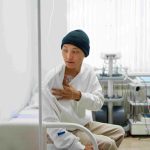By Gan Yu Han
Colorectal cancer (CRC), as defined by the World Health Organization (WHO), is a type of cancer that affects the colon (large intestine) or rectum. It is one of the most common and deadly cancers worldwide. In 2020, there was an estimation of 1.9 million new cases and over 930,000 deaths caused by CRC. Many individuals do not experience symptoms in the early stages of the disease, which highlights the importance of regular screenings for early detection and treatment.
Early-stage CRC are associated with significantly higher survival rates compared to those diagnosed at later stages. Notably, by 2040, cases are projected to rise to 3.2 million annually, with 1.6 million deaths. [1]
Speaking at the National Cancer Congress Malaysia 2025 – Prevention Session, Allied Health Professionals Track – Dr. Luqman Mazlan pointed out – “In Malaysia, it is the second most common form of cancer – representing about 13.5% of new diagnoses. As of the most recent registry-based estimates (covering up to 2021), Malaysia’s CRC incidence stands at approximately 19.9 cases per 100,000 population overall.”
Most CRC begin as polyps, which are abnormal growths of tissues on the inner lining of the colon or rectum. While many polyps are benign, some can become cancerous over time. If a polyp turns cancerous, it may grow into the colon wall and spread through blood or lymph vessels to lymph nodes or distant organs. [2]
The risk of CRC increases with age, particularly after age 50. Other major risk factors include a personal or family history of colorectal cancer or polyps, and inherited syndromes such as familial adenomatous polyposis (FAP) and Lynch syndrome. Inflammatory bowel diseases like Crohn’s disease and ulcerative colitis also elevate risk. Lifestyle factors play a significant role. Having sedentary habits, diets high in processed meats and low in fiber, being overweight or obese, smoking, and excessive alcohol use can contribute to increased risk. [1,3]
CRC may not cause noticeable symptoms in its early stages, but as the disease progresses, various warning signs can appear. These include persistent changes in bowel habits (such as diarrhea, constipation, or narrowing of the stool), rectal bleeding or blood in the stool (either bright red or dark and tar-like), abdominal discomfort, unexplained weight loss, fatigue, and iron deficiency anaemia due to chronic bleeding. [1,4]
Regular screening for CRC is recommended beginning at age 45. One of the gold-standard and widely accessible tools for early detection is the fecal immunochemical test (FIT or iFOBT). This non-invasive test can detect signs of cancer up to 2–3 years earlier than symptom-based diagnosis, significantly improving the chances of successful treatment and survival. [5] However, from 2014 to 2018, only 2.29% of the population were screened for CRC, even though iFOBT is widely encouraged to perform at home among populations from diverse socio-demographic backgrounds [7]. Dr Luqman noted that such low rates could be attributed to embarrassment, discomfort, low awareness; provider factors include lack of physician recommendation and limited resources.
Although not all cases are preventable, adopting a healthy lifestyle can reduce the risk. Staying active, eating a diet rich in fruits, vegetables, and whole grains, maintaining a healthy weight, and avoiding tobacco and excessive alcohol are all protective. [6] Dr. Luqman highlighted , “Fiber supports gut health by promoting regular bowel movements, reducing harmful transit time, and fostering beneficial gut bacteria. Similarly, physical activity of ≥150 minutes per week reduces colon cancer risk by 21–27%. In survivors, consumption of a balanced diet and maintaining a healthy weight may reduce recurrence.”
In summary, colorectal cancer is a serious yet often preventable disease. Raising awareness, encouraging healthy habits, and supporting early detection are key to reducing its global impact.
References:
- World Health Organization. Colorectal cancer [Internet]. Geneva: WHO; 2024 [cited 2025 Aug 5]. Available from: https://www.who.int/news-room/fact-sheets/detail/colorectal-cancer
- American Cancer Society. What is colorectal cancer? [Internet]. Atlanta: ACS; 2024 [cited 2025 Aug 5]. Available from: https://www.cancer.org/cancer/types/colon-rectal-cancer/about/what-is-colorectal-cancer.html
- Centers for Disease Control and Prevention. Risk factors for colorectal cancer [Internet]. Atlanta: CDC; 2024 [cited 2025 Aug 5]. Available from: https://www.cdc.gov/colorectal-cancer/risk-factors/index.html
- MD Anderson Cancer Center. Colorectal cancer symptoms [Internet]. Houston: MD Anderson; 2024 [cited 2025 Aug 5]. Available from: https://www.mdanderson.org/cancer-types/colorectal-cancer/colorectal-cancer-symptoms.html
- Ministry of Health Malaysia. Immunochemical Faecal Occult Blood Test (IFOBT) for Colorectal Cancer Screening [Internet]. Putrajaya: Ministry of Health Malaysia; published circa 2013–2014 [cited 2025 Aug 6]. Available from: https://www.moh.gov.my/moh/resources/auto%20download%20images/587f132517c45.pdf
- Centers for Disease Control and Prevention. Colorectal cancer prevention [Internet]. Atlanta: CDC; 2024 [cited 2025 Aug 5]. Available from: https://www.cdc.gov/colorectal-cancer/prevention/index.html
- Tamin NSI, Razalli KA, Sallahuddin SN, Chan HK, Hassan MRA. A 5-year evaluation of using stool-based test for opportunistic colorectal cancer screening in primary health institutions across Malaysia. Cancer Epidemiol. 2020;69:101829.





